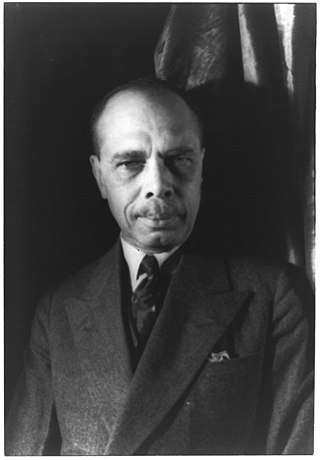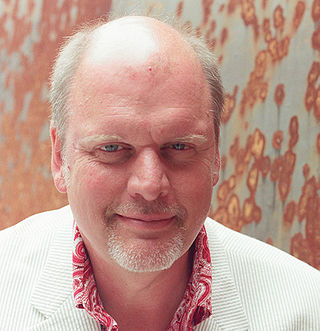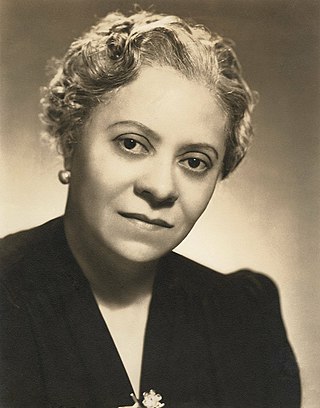Related Research Articles
Spirituals is a genre of Christian music that is associated with African Americans, which merged sub-Saharan African cultural heritage with the experiences of being held in bondage in slavery, at first during the transatlantic slave trade and for centuries afterwards, through the domestic slave trade. Spirituals encompass the "sing songs", work songs, and plantation songs that evolved into the blues and gospel songs in church. In the nineteenth century, the word "spirituals" referred to all these subcategories of folk songs. While they were often rooted in biblical stories, they also described the extreme hardships endured by African Americans who were enslaved from the 17th century until the 1860s, the emancipation altering mainly the nature of slavery for many. Many new derivative music genres such as the blues emerged from the spirituals songcraft.

James Weldon Johnson was an American writer and civil rights activist. He was married to civil rights activist Grace Nail Johnson. Johnson was a leader of the National Association for the Advancement of Colored People (NAACP), where he started working in 1917. In 1920, he was chosen as executive secretary of the organization, effectively the operating officer. He served in that position from 1920 to 1930. Johnson established his reputation as a writer, and was known during the Harlem Renaissance for his poems, novel and anthologies collecting both poems and spirituals of Black culture. He wrote the lyrics for "Lift Every Voice and Sing", which later became known as the Black National Anthem, the music being written by his younger brother, composer J. Rosamond Johnson.

William Grant Still Jr. was an American composer of nearly two hundred works, including five symphonies, four ballets, nine operas, over thirty choral works, art songs, chamber music, and solo works. Born in Mississippi and growing up in Little Rock, Arkansas, Still attended Wilberforce University and Oberlin Conservatory of Music as a student of George Whitefield Chadwick and then Edgard Varèse. Because of his close association and collaboration with prominent African-American literary and cultural figures, Still is considered to be part of the Harlem Renaissance.

Harry Burleigh was an American classical composer, arranger, and professional singer known for his baritone voice. The first black composer who was instrumental in developing characteristically American music, Burleigh made black music available to classically trained artists both by introducing them to spirituals and by arranging spirituals in a more classical form. Burleigh also introduced Antonín Dvořák to Black American music, which influenced some of Dvořák's most famous compositions and led him to say that Black music would be the basis of an American classical music.

Michael Kevin Daugherty is an American composer, pianist, and teacher. He is influenced by popular culture, Romanticism, and Postmodernism. Daugherty's notable works include his Superman comic book-inspired Metropolis Symphony for Orchestra (1988–93), Dead Elvis for Solo Bassoon and Chamber Ensemble (1993), Jackie O (1997), Niagara Falls for Symphonic Band (1997), UFO for Solo Percussion and Orchestra (1999) and for Symphonic Band (2000), Bells for Stokowski from Philadelphia Stories for Orchestra (2001) and for Symphonic Band (2002), Fire and Blood for Solo Violin and Orchestra (2003) inspired by Diego Rivera and Frida Kahlo, Time Machine for Three Conductors and Orchestra (2003), Ghost Ranch for Orchestra (2005), Deus ex Machina for Piano and Orchestra (2007), Labyrinth of Love for Soprano and Chamber Winds (2012), American Gothic for Orchestra (2013), and Tales of Hemingway for Cello and Orchestra (2015). Daugherty has been described by The Times (London) as "a master icon maker" with a "maverick imagination, fearless structural sense and meticulous ear."

Robert Nathaniel Dett, often known as R. Nathaniel Dett and Nathaniel Dett, was a Canadian-American composer, organist, pianist, choral director, and music professor. Born and raised in Canada until the age of 11, he moved to the United States with his family and had most of his professional education and career there. During his lifetime he was a leading Black composer, known for his use of African-American folk songs and spirituals as the basis for choral and piano compositions in the 19th century Romantic style of Classical music.

Clarence Cameron White was an American neoromantic composer and concert violinist. Dramatic works by the composer were his best-known, such as the incidental music for the play Tambour and the opera Ouanga. During the first decades of the twentieth century, White was considered the foremost black violinist. He was a member of Alpha Phi Alpha fraternity.

Florence Beatrice Price was an American classical composer, pianist, organist and music teacher. Born in Little Rock, Arkansas, Price was educated at the New England Conservatory of Music, and was active in Chicago from 1927 until her death in 1953. Price is noted as the first African-American woman to be recognized as a symphonic composer, and the first to have a composition played by a major orchestra. Price composed over 300 works: four symphonies, four concertos, as well as choral works, art songs, chamber music and music for solo instruments. In 2009, a substantial collection of her works and papers was found in her abandoned summer home.

Henry Edward Krehbiel was an American music critic and musicologist who was the chief music critic of The New York Tribune for more than forty years. Along with his contemporaries Richard Aldrich, Henry Theophilus Finck, W.J. Henderson and James Huneker, Krehbiel is considered part of the 'Old Guard', a group of leading New York–based music critics who first established a uniquely American school of criticism. A critic with a strong bend towards empiricism, he frequently sought out first hand experiences, accounts and primary sources when writing; drawing his own conclusions rather than looking to what other writers had already written. A meliorist, Krehbiel believed that the role of criticism was largely to support music that uplifted the human spirit and intellect, and that criticism should serve not only as a means of taste making but also as a mode to educate the public. His book How to Listen to Music was widely used as an instructional guide by the music consuming public in the United States during the last years of the 19th century and first several decades of the 20th century.

The University of Michigan Men's Glee Club is an all-male glee club at the University of Michigan. With roots tracing back to 1859, it is the second oldest glee club in the United States and is the oldest student organization at the university. The club has won the Llangollen International Musical Eisteddfod on four separate occasions. Since 2018, the Club's musical director has been Mark Stover, who has continued to expand the Club's repertoire and arranged performances.
William Hugh Albright was an American composer, pianist and organist.

Benjamin Rush "Rusty" Magee was an accomplished comedian, actor and composer/lyricist for theatre, television, film and commercials.

Margaret Allison Bonds was an American composer, pianist, arranger, and teacher. One of the first Black composers and performers to gain recognition in the United States, she is best remembered today for her popular arrangements of African-American spirituals and frequent collaborations with Langston Hughes.
Ross Lee Finney Junior was an American composer who taught for many years at the University of Michigan.
Florence Cole Talbert-McCleave, also known as Madame Florence Cole-Talbert, was an American operatic soprano, music educator, and musician. Called "The First Lady in Grand Opera" by the National Negro Opera Guild, she was one of the first African American women and black opera artists performing abroad who received success and critical acclaim in classical and operatic music in the 20th century. Through her career as a singer, a music educator, and an active member of the National Association of Negro Musicians, she became a legendary figure within the African American music community, also earning the titles of "Queen of the Concert Stage" and "Our Divine Florence."
Peter Sparling is a 20th-century American dancer and dance professor. He is a Thurnau professor and former chair of the University of Michigan Department of Dance and Artistic Director of the Peter Sparling Dance Company, based in Ann Arbor.
Uzee Brown Jr. is an American singer, performer, composer, arranger, educator, and choir director from Cowpens, South Carolina. Brown has graduated from Berkshire Music Center, Tanglewood and the University of Siena in Italy, he holds degrees from Morehouse College (B.A.), Bowling Green State University, and University of Michigan.
Robert Lee Owens III was an American composer, pianist, and actor.
Betty Jackson King was an American pianist, singer, teacher, choral conductor, and composer. She was best known for her vocal works.

Everett McCorvey is an American classical tenor, teacher, impresario, conductor and producer, living in Lexington, Kentucky, where he holds an Endowed Chair in Opera Studies at the University of Kentucky, is director of the University of Kentucky Opera Theatre and Professor of Voice. He is also the founder and conductor of the American Spiritual Ensemble, Artistic Director of the National Chorale and President of Global Creative Connections, a production company producing live public and private events. He has also been on faculty at the American Institute of Musical Studies in Graz, Austria, the Opera Theatre of St. Louis, and the Bay View Music Festival in Bay View, Michigan. His students have won numerous national and international singing competitions and regularly perform at leading houses throughout the world.
References
- 1 2 3 Darryl Glenn Nettles (2003). African American Concert Singers Before 1950. McFarland. pp. 131–132. ISBN 9780786414673.
- ↑ Cori Ellison (February 14, 1999). "Music; The Black Art Song: A Forgotten Repertory". The New York Times .
- 1 2 3 "AACHM Oral History: Willis Patterson". AACHM Oral History. September 21, 2013. Retrieved April 3, 2024.
- ↑ "A formal tribute to Duey". The Michigan Daily . March 30, 1969. Retrieved September 10, 2013.